One sure trait of living things is the desire to live; it envelops a host of urges consciously pursued and subconsciously automatic—from eating to working to breathing. At its most poignant expression this desire to live, particularly when threatened, manifests itself as something called the fight for survival.
Yet alongside this meta-trait of living things is a second, equal in potency: the desire to proliferate. Whether biologically or by influence or legacy, an essential part of living is to seek to leave behind more life. Especially in the higher orders of created life, this urge of the living goes beyond having offspring, and swells with the unremitting, even wanton devotion to both protect and nurture one’s offspring until that progeny are launched into their own fruitfulness. Creatures and cultures, organisms and organizations, are judged by which urge, especially under great strain, takes precedence.
In the summer of 2017 our Regional Pastors and I gathered for our annual summit in Minot, North Dakota. During that summit we discussed the state of the Church of the Lutheran Brethren (CLB), the priority needs and opportunities before us in North American Mission, and also the role of Regional Pastor to engage those priorities. It had been nearly a decade since our Home Missions department had been restructured into the department of North American Mission (NAM), with five regional pastor positions serving its mission, with a strong focus on facilitating pastoral health at its core.
At our summit we discussed how the needs of our congregations and the challenges of our mission context had morphed since that initial restructuring and sharpened in clarity to us. We noted that we no longer were hearing the same level of concern we once heard regarding the isolation and needs of our pastors. We believed that to be a positive sign about the work which our Regional Pastors have engaged, but we also sensed that it was a time to reevaluate the best structure of the department. We desired to address the changing mission opportunities in our communities and culture, and we asked the question, “Does our current structure best facilitate our desire to be a disciple-making movement?”
These initial conversations led to a series of meetings with the CLB Mission Team, Council of Directors, CLB clergy, other ministry leaders, and regional leadership of the CLB. In those meetings mission priorities were discussed, organizational restructure drafts were presented, and much engagement over feedback was processed. All of this culminated in the CLB Council of Directors voting at its Spring 2019 meeting (April 11-12) to restructure our NAM department from five regional pastor positions into two full-time positions—Director of NAM and an Associate Director (Mission Mobilizer).
These would be focused on two central mission-advancing priorities: congregational vitality and congregational reproduction (church planting). Also, in this restructure, an Associate Director for Congregational and Pastoral Support would be added in the Office of the President to serve the current needs and transitions of CLB congregations and pastors. This re-staffing allows us to prioritize personnel and financial resources more decidedly on proactive initiatives that will help shape us into the disciple-making movement we believe the Lord is calling us to be.
Because these structural and staffing shifts also entail constitutional changes, the COD’s action was to vacate the five regional pastor positions effective June 30, 2019, and to provisionally call a Director of NAM and Associate Director to serve the CLB until constitutional amendments can be debated and acted upon at the 2020 biennial convention. This would follow the reading of proposed amendments at this summer’s regional conventions (and the CLB–Canada’s convention next spring).
There is a high calling inherently instilled with God’s gift of life. I suspect that most every one of us—if pressed by circumstance between the desire to survive and the desire to proliferate; if faced with the choice to sustain our own life, or to give and protect the life of our child or many children—would give ourselves without hesitation to the latter.
Please join me in prayer and gratefulness for our Regional Pastors and their wives: Warren and Cindy Geraghty, Roger and Carol Olson, Stan and Cheryl Olsen, Gary and Deb Witkop, and Phil and Wendy Heiser. Their ministry past and current, and their selfless devotion to the CLB, with vision and commitment to advance our North American Mission, is greatly esteemed and appreciated by myself and the rest of your Council. They are to be affirmed by the Church. Our RPs have selflessly given themselves to this restructuring plan at the cost of their own positions because their desire for the CLB is to see it proliferate, unto the will and glory of God.
I am both invigorated and a bit intimidated by this great shift before us. Please be in prayer for your synodical leadership in these coming months as roles end and beloved colleagues shift into the next seasons of life and ministry God has before them. Pray for new leaders who will be summoned to lead. And, pray for a wisdom to see, and a tenacity to pursue, the mission priorities that are to be shaped and followed.
As the Old Testament rites of circumcision and Passover pre-echo the new covenant in Christ birthed in baptism and nurtured in the Lord’s Supper, so the earliest repeated commission heard at creation to “be fruitful and multiply” is also forerunner to the commission for God’s people in the re-creation mission of the new covenant: “Go make disciples.” The Church is a living thing. Christ’s body has Christ’s heart. Jesus’ disciples, called to both follow him and make others his disciples, know which trait of the living pulsed in the heart of the One we follow. Jesus’ gospel for us and through us is sourced in his desire to proliferate even more than his desire to live. This we see at the cross, and from his cross we see the path forward for the CLB.
Grace and Peace,

Rev. Paul M. Larson, President
Church of the Lutheran Brethren

